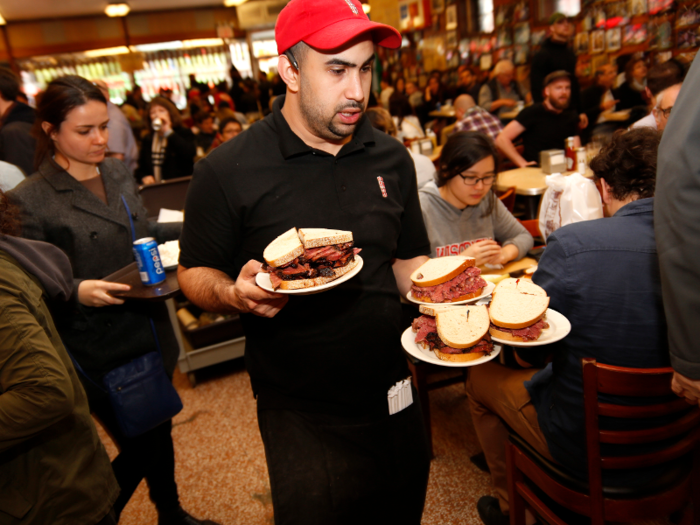
New York City voted to raise the minimum wage to $15 this year, which represented a pay increase in 20% to 28% for the area's restaurant workers. The pay hike had little impact on the city's restaurant growth, according to a recent report out of The New School.
"It's hard to look at the comprehensive data we did and not understand that many, many restaurants have effectively adapted to the rising minimum wage," James Parrott, a director of economic and fiscal policies at the New School and an author of the study, told Gothamist. "Not everyone, but the vast majority."

Vox reported that while many restaurant owners threatened to move shop after the $15 wage passed, few of them followed through on their threats. In fact, restaurant jobs in Seattle have been steadily rising since 2015, according to the Federal Reserve.
Yet businesses did raise prices and reduce employee work hours after the wage hike, Vox's Matthew Zeitlin reported. Even with the shorter workdays, some research indicated workers still saw their pay go up.

The Bay Area has some of the highest minimum wages in the country (in part due to the area's high cost of living). San Francisco and San Jose currently have $15 minimum wages, and Oakland pays these workers $13.80.
While the impacts of the $15 is still yet to be understood, a 2018 study released by the University of California-Berkeley analyzed minimum wages in these cities in 2016, when they were all above $10.
The study could not find negative employment effects after minimum wages increased in the Bay Area's restaurant industry. The researchers separated restaurants into full-service and limited-service (or "fast-casual" Chipotle-style chains), and could not find significant employment effects on either type of eatery.
"Our findings suggest that the low-wage community as a whole clearly benefited from minimum wage policies in the $10 to $13 range, particularly if labor-labor substitution effects are minimal," Sylvia Allegretto, labor economist at University of California-Berkeley and lead author of the report, stated.

Despite the fact that DC voted to raise the minimum wage for tipped restaurant workers in June 2018, lawmakers repealed the referendum — called Initiative 77 — in October of that year.
The initiative would have ensured restaurant workers get minimum wage regardless of how much they make in tips. Restaurants can pay tipped workers less than $14 if they make up for the difference. Labor groups say this policy still does not ensure workers make enough money.
National Restaurant Association and the Restaurant Association of Metropolitan Washington opposed the wage increase, saying restaurants would lay off workers and raise prices to offset higher wages.
Economists at the liberal Economic Policy Institute say paying tipped workers the minimum wage increases earnings and reduces poverty among these employees. Since the law was never enacted, it's impossible to know how the increased wage would have impacted employment.

Earlier this year, Illinois governor J.B. Pritzker signed a bill to increase the state's minimum wage to $15 by 2025. Back in 2014, the city of Chicago voted to raise the city's minimum wage to $13 by 2019.
Since the city government began raising pay for low-wage workers five years ago, there were no changes to employment or the growth of private businesses as of 2016, according to a report out of the University of Illinois-Urbana Champaign.
While Chicago's wage hike boosted incomes for workers in transportation, maintenance, and administrative services, restaurant employees did not see higher annual incomes due to the policy.
"The Chicago Minimum Wage Ordinance has been associated with positive impacts on incomes with little to no effect on employment," the report stated. "Though the minimum wage should be expanded and enforcement should be improved, the minimum wage hikes – by raising standards in the local labor market – have been good for workers in the city."
 Stock markets stage strong rebound after 4 days of slump; Sensex rallies 599 pts
Stock markets stage strong rebound after 4 days of slump; Sensex rallies 599 pts
 Sustainable Transportation Alternatives
Sustainable Transportation Alternatives
 10 Foods you should avoid eating when in stress
10 Foods you should avoid eating when in stress

Copyright © 2024. Times Internet Limited. All rights reserved.For reprint rights. Times Syndication Service.